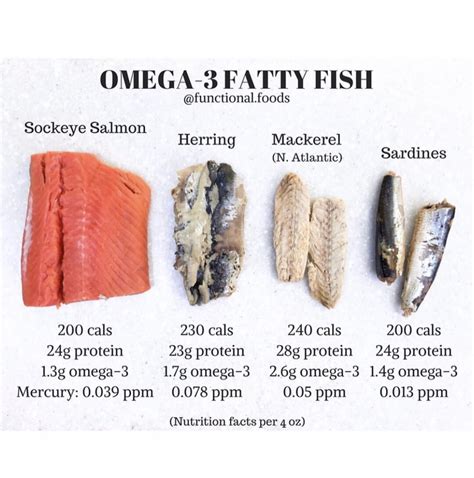Fatty Fish - Omega-3 Benefits and Varieties
Fatty Fish (e.g. FAQ
Are fatty fish good for You?
All fish are a good source of protein, vitamins and minerals. But fatty fish contain omega-3 fatty acids. Omega-3s and other nutrients in fish may improve heart health. They also may lower the risk of dying of heart disease. Some people may worry about mercury or other contaminants in fish.
Which fish has the most omega-3 fatty acids?
Fatty fish contain the most omega-3 fatty acids and seem to benefit the heart the most. Good omega-3-rich fish options include: Salmon. Sardine. Atlantic mackerel. Cod. Herring. Lake trout. Canned, light tuna. How much fish should I eat? The U.S. Food and Drug Administration (FDA) recommends fish as part of a healthy diet for most people.
Does white fish have fatty acids?
White fish contains fatty acids, but only in the liver, and in smaller quantities. Consuming oily fish can help protect against cardiovascular disease, according to the AHA. A study published by the American Physiological Society suggests that fatty fish oils can also protect the heart during times of mental stress.
Is oily fish good for You?
Oily fish contains long-chain omega-3 fatty acids. Long-chain omega-3 can help to prevent heart disease. It is also important for women who are pregnant or breastfeeding, because it can help a baby's nervous system to develop. Oily fish are the richest source of long-chain omega-3.
What fatty acids are found in fish?
The omega-3 fatty acids EPA and DHA are found in seafood, such as fatty fish (e.g., salmon, tuna, and trout) and shellfish (e.g., crab, mussels, and oysters). A different kind of omega-3, called ALA, is found in other foods, including some vegetable oils (e.g., canola and soy).
What are the health benefits of oily fish?
Oily fish is associated with various health benefits, including a lower risk of heart disease, improved mental ability, and protection from cancer. Fish oil contains the two fatty acids, eicosapentaenoic acid (EPA) and docosahexaenoic acid (DHA). These are believed to benefit the cardiovascular system.
Fatty Fish (e.g. References
If you want to know more about Fatty Fish (e.g., consider exploring links below:
What Is Fatty Fish (e.g.
- https://www.nhs.uk/live-well/eat-well/food-types/fish-and-shellfish-nutrition/
- https://www.nutritionadvance.com/fatty-fish/
- https://nutritionalmagazine.com/what-is-a-fatty-fish/
- https://eatwell.uky.edu/blog/what-are-fatty-fish
- https://www.medicalnewstoday.com/articles/9978
- https://www.verywellfit.com/best-fish-for-omega-3-fatty-acids-2506714
- https://www.mayoclinic.org/diseases-conditions/heart-disease/in-depth/omega-3/art-20045614
- https://www.webmd.com/cholesterol-management/features/low-cholesterol-diet-fatty-fish
- https://www.ncbi.nlm.nih.gov/pmc/articles/PMC6861329/
- https://www.heart.org/en/healthy-living/healthy-eating/eat-smart/fats/fish-and-omega-3-fatty-acids
Fatty Fish (e.g. Information
Explore Related Topics
The Role of Omega-3 in Exercise-Induced Asthma: Fact or Fiction?
Delve into the relationship between omega-3 intake and its effects on exercise-induced asthma. Does it make a difference?
